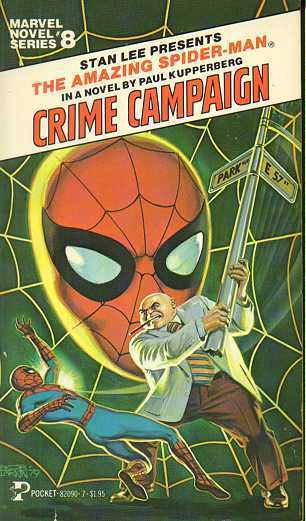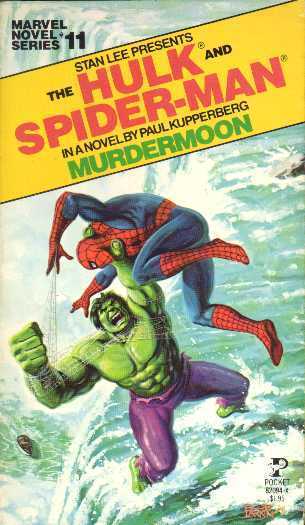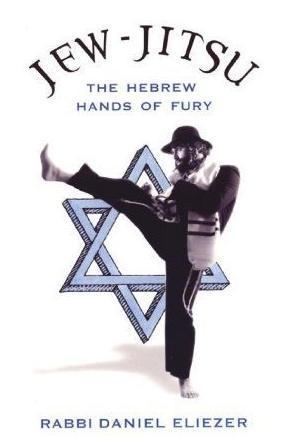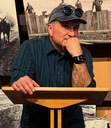Author Interview: Paul Kupperberg - Part One
What Paul may be most known for, however, is his extensive work in the comic book industry. He has written for such titles as Superman, Supergirl, Aquaman, Green Lantern, Doom Patrol, Captain America, Conan, Scooby Doo and more. In addition, he is the creator of three DC Comics titles including Checkmate, Arion: Lord of Atlantis, and Takion.
I appreciate Paul taking the time to be with us!

First, tell us where we can find you online.
I’m all around in the dark, wherever you can look--wherever there’s a fight so hungry people can eat, I’m there. I’m in the way guys yell when they’re mad, in the way kids laugh when they’re hungry and they know supper’s ready...but mostly, I’m at Paulkupperberg.com, also known as “And Then I Wrote...”.
What inspired you to write comics and what was your first professional job in the comics industry?
I almost feel like a career in comics was inevitable for me. Comic books have been a part of my life for as long as I can recall. I guess having a brother a couple years older and an uncle ten years older living nearby helped expose me to them at an early age, and I was collecting them by the time I was at least seven or eight years old. In middle school, I met Paul Levitz and we started producing fanzines together and were deeply involved in the whole fan scene throughout high school.
Writing was another lifelong interest. I’ve got stories and comic books I was writing when I was eight or nine years old, so by the time I was in college, majoring in English literature, the writing bug and the professional connections kind of converged and I started submitting stories to some of the smaller comic book companies, like Gold Key and Charlton. My first sales were to editor Nick Cuti at Charlton Comics, short stories for their horror anthology titles, in 1975. The first story I sold was a five-pager called “Distress” which appeared in Scary Tales #3. A few months later, I started selling to DC Comics.
In addition to your extensive work at DC Comics, you also wrote two Spider Man novels in 1979,
Crime Campaign and Murdermoon. Did you pitch these ideas to Marvel/Pocket or vice versa?
Marvel writers Marv Wolfman and Len Wein, who were friends, were packaging the series of twelve Marvel novels for Pocket Books--although only eleven were published; a Silver Surfer novel was shelved because of the possibly of a film, if I remember correctly. Anyway, I was invited to write one of the books...I probably lobbied them for the job, since I didn’t have any experience writing prose at that point in my career and all they had to go on was my word that I could handle a novel, but after I turned in Crime Campaign, I guess they either figured I had the chops or were just really desperate to find someone to write the last one in the series, because they offered me the Spider-Man/Hulk team-up that became Murdermoon. Looking at them now, I’m assuming it was the desperation, but it was great experience and I’m glad I got the chance to do them.
I’ve known Michael Jan Friedman for nearly 20 years through fan-run conventions like Farpoint and Shore Leave. What brought you two together to co-write the middle grade novel The Sirian Conspiracy for the Wishbone Mystery series (Big Red Chair Books, June 1999)?
I got to know Friedman in the early ‘90s when I took over editing Darkstars, a title he had created with Travis Charest a little more than a year before I came on board. Mike had been writing Wishbone novels and he put me on to the editor to pitch for writing work for them. I forget who the original editor was I was dealing with, but I pitched a Wishbone version of Frankenstein, with Wishbone in the role of Victor Frankenstein.
For those who don’t remember the series, Wishbone was a PBS program “starring” a little terrier named Wishbone who retold classic stories and novels in the context of a “real life” story he and/or his human friends were involved in, with Wishbone in the key role of the retellings. It was a really cute and charming show, designed to excite kids about the great books and promote literacy. Big Red Chair Books had several different book series based on the show, including the retelling of the classics, a younger readers program, and a series of original Wishbone Mysteries.
So, I pitched the Frankenstein story, wrote several sample chapters, but got a lot of editorial runaround, so Mike suggested we co-write his next Wishbone Mystery that he was doing with a different editor, Kevin Ryan. I believe it was Mike’s plot, but I wrote the front half of the book and Mike the back end.
Your career has covered a diverse range of topics and genres including non-fiction and humor. What inspired Jew-Jitsu, The Hebrew Hands of Fury (Citadel, October 2008)?
Yeah, I’ve made it a point to work on as many different genres as possible; I’ve written comic books, newspaper comic strips, online animation, story books, chapter books, YA novels, color and activity books, non-fiction, reviews, essays, advertising and promotional writing...just yesterday, I wrote packaging copy for the box of a new tablet computer that’s coming to market.
For the first twenty years of my career probably 90% of my writing was for comics, but as I got more comfortable writing prose and was able to sell a few stories here and there, I started branching out into that. In 2001, I started writing young adult non-fiction books for Rosen Publishing on topics including history, science, and biography. In 2005, I wrote a novel starring the Justice Society of America for DC Comics that was to be published by iBooks, a publisher that went under after the death of its owner, Byron Preiss; the company closed its doors quite literally the week JSA: Ragnarok was scheduled to go to press. I started writing humor in the late-70s, doing movie parodies and other pieces for Crazy Magazine, Marvel’s MAD Magazine rip-off, and later on for DC’s Cartoon Network titles with characters like Johnny Bravo, I.M. Weasel, Scooby Doo, and others.
Jew-Jitsu was an outgrowth of my tenure as executive editor of Weekly World News, the black and white tabloid of fake news from the publishers of the National Enquirer and other tabloids. I left my editorial staff position at DC in 2006 for WWN, where I was working on a number of fronts, including editorial, licensing, and writing. A typical WWN article was a strange blend of fact and fiction served up with heaping helpings of absurdity and social satire.
We published an article about Jew-Jitsu, a martial art developed by a Hassidic Jew, which caught the eye of an editor at Kensington Books. The editor wanted to expand this two page article into an entire how-to manual, but the writer of the article didn’t feel he had an entire book on the subject in him. I did, though, so WWN editor-in-chief Jeff Rovin gave me the gig. I’m a big fan of absurd humor, plus I’m a big old Jew from Brooklyn who knows a smattering of Yiddish and a bit about Jewish religious traditions and customs.
Weekly World News folded in mid-2007, but Kensington had enough confidence in Jew-Jitsu to go through with the project even without WWN branding...unlike another book we were working on for Random House, Mutant Pets, Alien School Boards, and Yard Sales: the Weekly World News Book of Suburban Legends.
Part Two of Paul's interview continues here!
Paul Kupperberg on Amazon


[image error]




